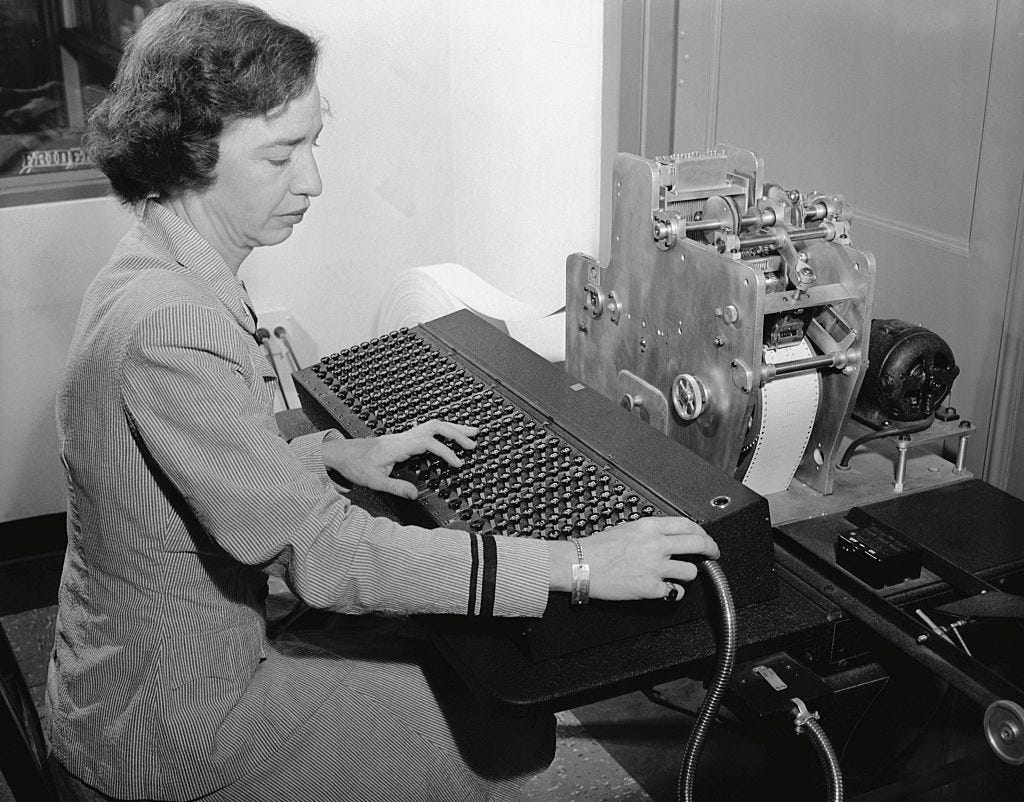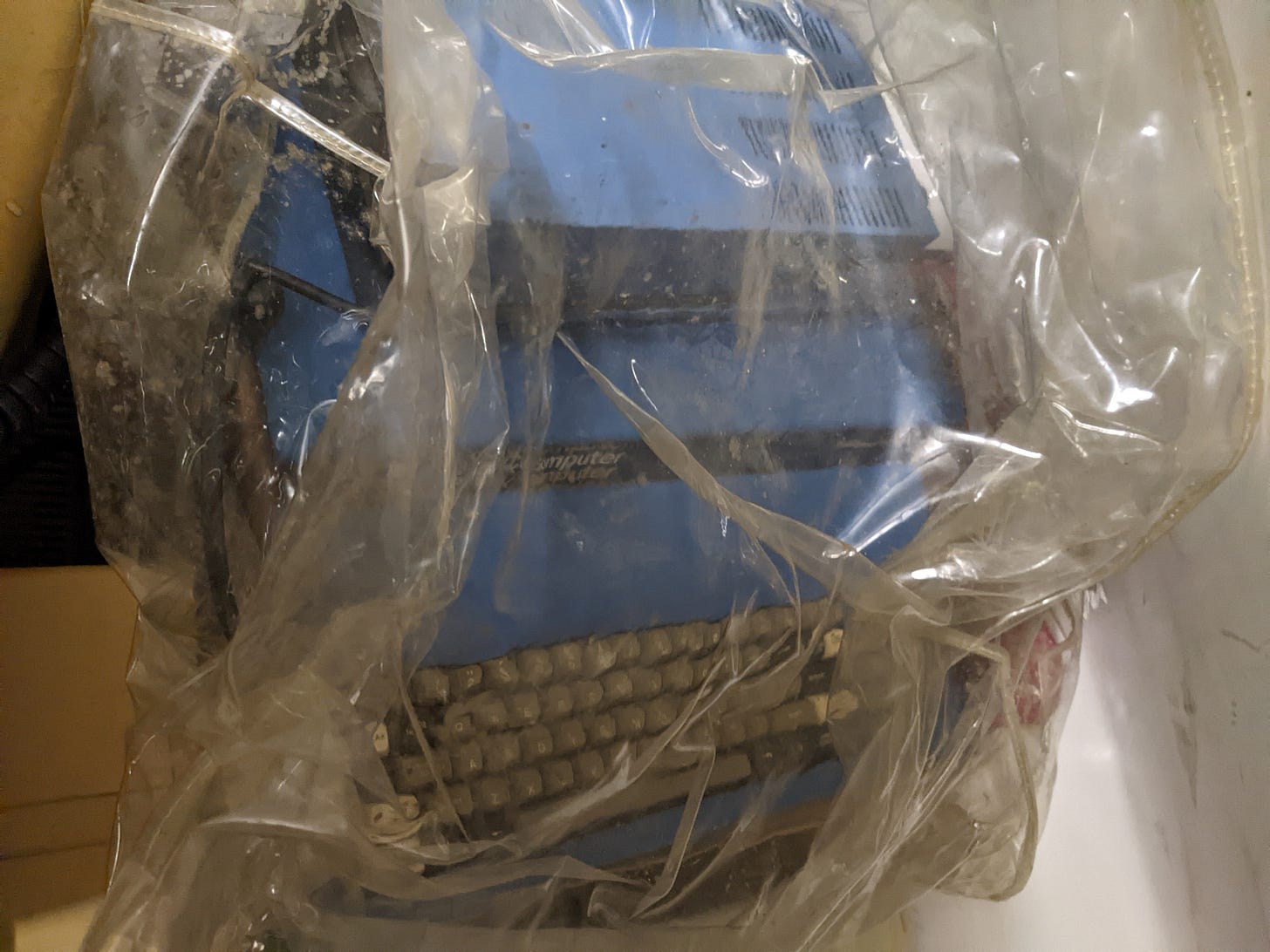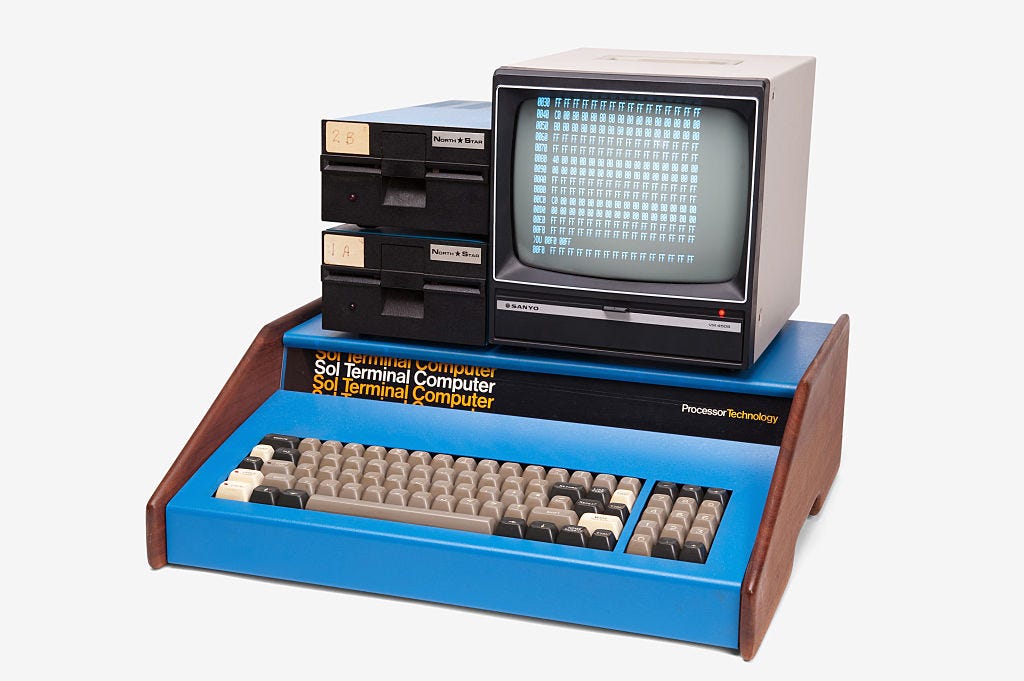'Interesting Software' Update
Four programs that make a difference in my life. Maybe they'll be useful to you. And which ones should be next for me?

This post is not about the urgent politics of the moment. Rather it’s about computers.
It has three purposes: to compile past reports on the way software has, and has not, evolved to serve creative ends; to list the products I now find most valuable for working, writing, list-making, and even “thinking”; and to invite ongoing suggestions and tips.
1. The Road from ‘The Electric Pencil’
Back in the late 1970s I bought an early version of what was then called a “micro-computer.” The model I got was the Processor Technology Sol-20. It was an absolutely beautiful machine, in form and function. As far as I know, it was the only computer ever to come in a classy walnut-burl case, part of the design from its creator, the renowned Lee Felsenstein.
Our Sol-20 is still in the basement somewhere. It looks just like this one (below), now in the Computer History museum in California. The main difference is that the museum model has “floppy disk” drives attached. Mine stored its data on audio cassette tapes, which ran on little Radio Shack recorders.
The operating system for this computer was Northstar DOS. By the late 1970s the Sol-20 and Northstar had given way to new offerings from Commodore, Tandy Radio Shack, and others including a startup called Apple.
But the humble Sol-20 system was where I learned computer use, and programming language, and the first-ever word processing program for a personal computer. That was called The Electric Pencil, written by Michael Shrayer, a screenwriter based in Palm Springs. I used this computer and that program to write my book National Defense, and for an Atlantic account of computer use back in 1982, at a time when many of my writer-friends were skeptical about leaving typewriters.
And after that …
—Through the 1980s, I wrote in The Atlantic and elsewhere about machinery and software. Most of these dispatches, including one about trying to make email connections from a pay phone in Malaysia, and another about the very first “portable” computers (which were the size of an airline carry-on suitcase) no longer appear to be on line. Some day I’ll scan and digitize my bound-volume copies. Essay topic for grad students: the ways in which “antique” technology, like bound volumes of magazines, can be more “future-proof” than the successors.
—In the 1990s, I wrote in various computer magazines (including the spectacular-and-doomed Industry Standard) and in The Atlantic about ongoing tech progress. For example this, about the dawn of the Java operating system; or a series about two beautiful-but-doomed programs from Mitch Kapor’s Lotus known as Magellan and Agenda. A number of these pieces also seem no longer to exist online, but I did a later piece summing them up here.
—For several years in the 2000s I did a regular column for the New York Times Sunday business section, for my friend and editor Jim Impoco, about personal technology. The signoff column from that series is here, and a dozen-plus subsequent Atlantic technology columns are grouped here.
—And ever since then, I’ve been weighing in about writing programs, and online storage programs, and “Personal Brain” programs, and more (and more and more and more and more).
I’m listing items in this ad-hoc archive for my own purposes, but also to illustrate that for many decades digital “tools for thinking” have been an important and evolving complement to pre-digital tools and styles of thought.

2. The tools of the moment.
We all use programs that are the equivalent of electricity or water-from-the-tap. That is, we rely on them, but we also take their existence for granted, and notice them mainly when something goes wrong.
Email is in this category, plus a number more: Calendar and scheduling programs; photo storage and sharing; “word-processing” (a terrible term when you think about it) and spreadsheets; mapping and directions; Zoom and other conferencing tools. And password managers — if you’re not using one, eventually you’ll be sorry. (I use LastPass.) I’m sure I’m leaving some out.
But here are four specific, non-generic programs that make a difference to me. I’ve written about each of them over the years but am bringing them together here:
Scrivener, for any writing task that’s more than a few hundred words long. The program is from a tiny, quirky software house that is based in Cornwall, England and is called Literature and Latte. There is absolutely nothing like it.
I started using Scrivener nearly fifteen years ago, and have written three books and hundreds of articles, posts, and speeches with it. One of the best testimonials to it is this, from back in 2010. That was by Noah Ennis, then a student in a writing class I was teaching at the University of Chicago, who had discovered the program’s power and who explains it very well.
The following year, the program’s creator, Keith Blount, was a “guest blogger” for me back when that was a thing — and back when I was using Scrivener to finish a China book. You’ll find some other installments in links above.
Try it for yourself. I know of almost no one who has done so and been disappointed.Tinderbox, for “managing ideas.” This is also from a very small “artisanal software” house, Eastgate, based in Watertown, Massachusetts. I’ve also used Tinderbox for nearly 15 years, and written about it frequently. (Update: Tinderbox is Mac-only. Scrivener has PC and Mac versions, and Neeva and Otter are web-based, so available on all platforms.)
The challenge in explaining what this program does is that it can do almost anything. It is like asking, “what can you do with a pencil?” or “what can you say, when you learn to talk?” I use it for managing schedules, for “whiteboarding,” for keeping track of projects, for just about everything. But, very much as with using a pencil or learning to talk, using it requires learning how.
Here is an index to multiple videos by other people that give an idea of why I’ve found it so powerful and indispensable. Including some videos in French! (If only Chinese were as easy to understand. Which is to say, if only I’d begun studying Chinese in grade school.)
Mark Bernstein, the creator of Tinderbox, was also a guest blogger—back when that was a thing.
Tinderbox is for now the highest point in a “software for thinking” journey that for me began almost 40 years ago. It’s gone from the sainted Lotus Agenda, through the sublimely elegant Zoot, through the beautiful-but-doomed Chandler, to others.
Check it out. Maybe it’s not for you. But if it is, then it is.Otter.ai. for handling audio. I wrote about this several months ago in this space. This program really does something I’d been dreaming of for decades. You feed in an audio recording, and it produces a usable transcribed version.
Back when I worked (briefly) at Microsoft, on the team producing Word XP, I remember placing a $1 bet with one of my colleagues. It was that neither of us would ever see a workable speech-to-text program.
If I run into him again, I’ll have to give him that dollar. It will be worth it, for what Otter has achieved.Neeva.com, for web searches. I also wrote about this several months ago. It is a new subscription-based search engine that undoes was the past decade of ad-encrustation has done to the (otherwise indispensable) Google. It gives you the results you’re looking for, right away, not buried by ads.
I use Google products in a million other ways, for what seems like a million hours a day. But I’ve done all web searches by Neeva for many months, and have been glad of it.
3. Learning about more.
There are many more programs I use and like. Including:
Scapple, also from Literature and Latte, for free-form outlining.
The Brain, of which Jerry Michalski has the canonical report and example here.
OmniOutliner, which I use in a “it does the job” spirit.
And others I am forgetting at the moment.
And there are many people whose ongoing thoughts on “interesting software” I follow. A few:
Dave Winer, one of the original “outliners are important” people;
Beck Tench, a computer scientist and tech-thinker;
Stephen Zeoli, who wrote about Tinderbox long ago and has covered this topic extensively ever since;
What other programs should I try? What are other names and thinkers I should be following? Will share the results here.



I'd love to hear some good discussion about "future proofing" technology, especially written records. What is the possibility that those living in the far future -- say 500 years -- look back at our time as a kind of "Dark Ages" where there are few written records of anything? They might recognize that the moldering hunks of silicon represented *some* kind of records but they are forever prevented from figuring out what they contain. Or to put it another way, will those in the year 2500 find those writing in the year 1500 spoke to them more clearly than those in 2022? For that matter, what records recorded electronically in, say, 1980 are no longer accessible to us and are now lost forever?
All I know is that I will carefully preserve my paper copies of the Atlantic, perhaps burying them in the yard, for the benefit of future archaeologists.
I have immense respect for Tinderbox and for Mark Bernstein, but day-to-day for working with ideas and information, finding themes and serendipitous connections, I find myself using Obsidian. Alone it's pretty bare-bones but it has hundreds of "plug-ins" (almost all free) which allow you to set up tagging, linking and data handling in ways that make sense to you.
It's all based on Markdown which means it's easy to get at your notes from the Finder (I use the Mac and iOS versions). It also means your stuff is on your own computer (even if you use one of the easy sync options). For me it has been a Scrivener or DevontThink level experience to move work into it. Maybe worth a look for you?